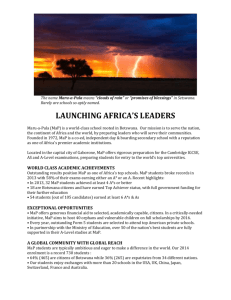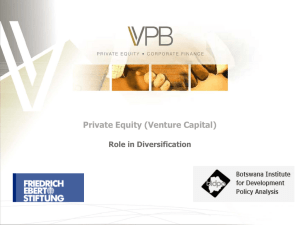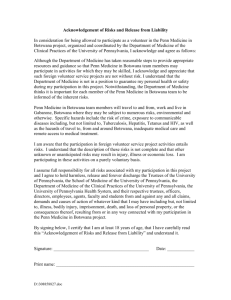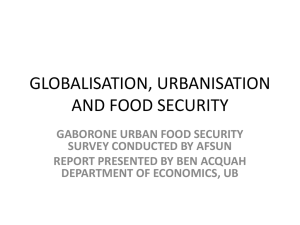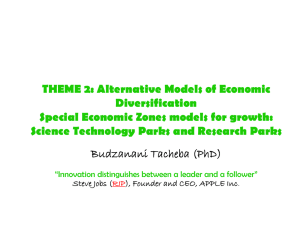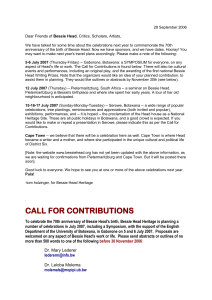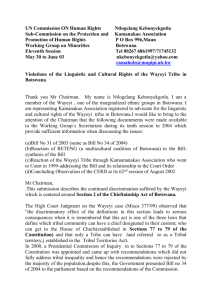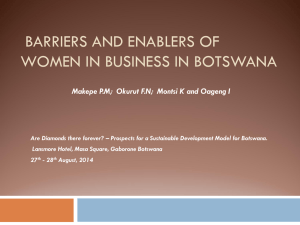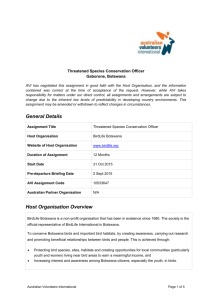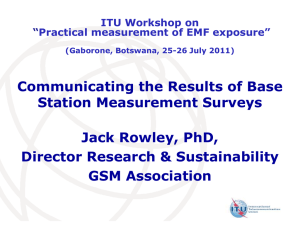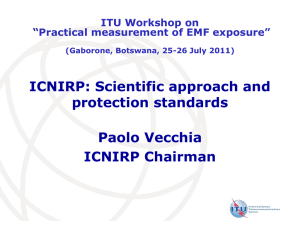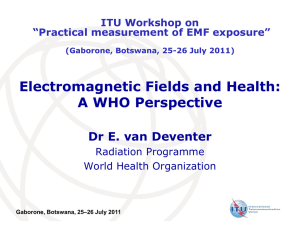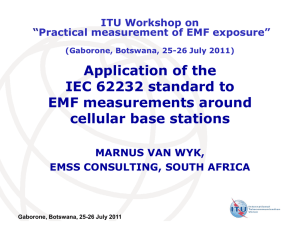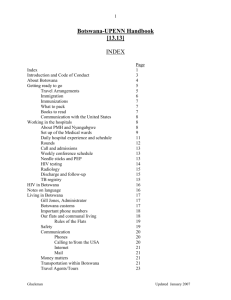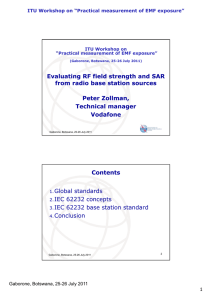BUSINESS PLAN
advertisement
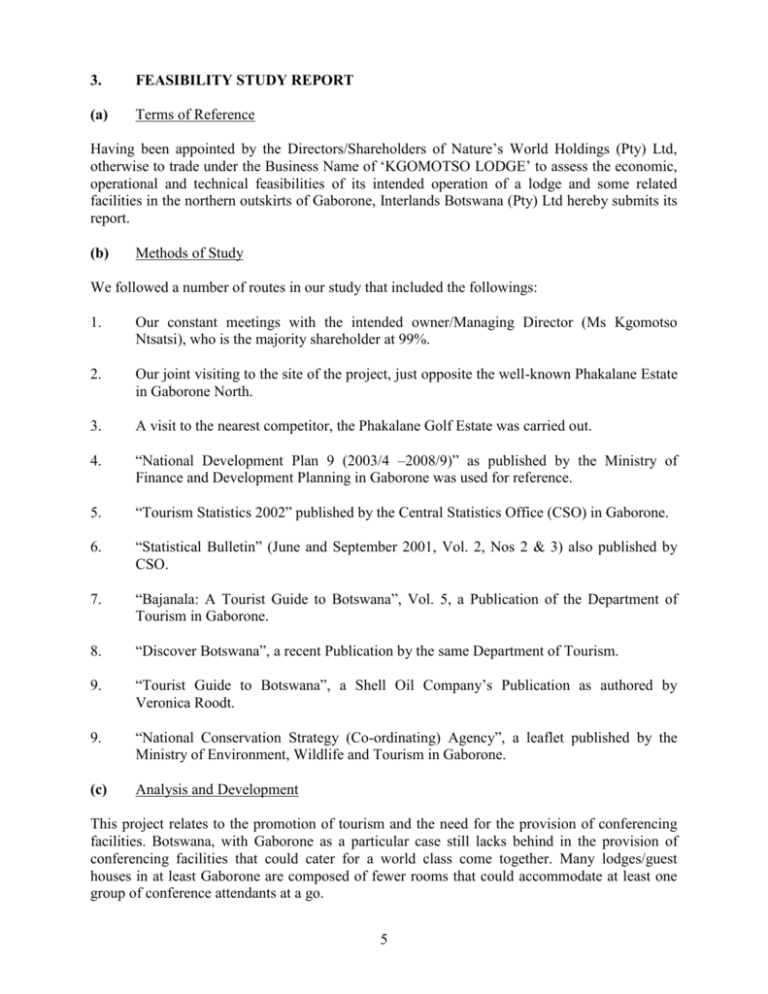
3. FEASIBILITY STUDY REPORT (a) Terms of Reference Having been appointed by the Directors/Shareholders of Nature’s World Holdings (Pty) Ltd, otherwise to trade under the Business Name of ‘KGOMOTSO LODGE’ to assess the economic, operational and technical feasibilities of its intended operation of a lodge and some related facilities in the northern outskirts of Gaborone, Interlands Botswana (Pty) Ltd hereby submits its report. (b) Methods of Study We followed a number of routes in our study that included the followings: 1. Our constant meetings with the intended owner/Managing Director (Ms Kgomotso Ntsatsi), who is the majority shareholder at 99%. 2. Our joint visiting to the site of the project, just opposite the well-known Phakalane Estate in Gaborone North. 3. A visit to the nearest competitor, the Phakalane Golf Estate was carried out. 4. “National Development Plan 9 (2003/4 –2008/9)” as published by the Ministry of Finance and Development Planning in Gaborone was used for reference. 5. “Tourism Statistics 2002” published by the Central Statistics Office (CSO) in Gaborone. 6. “Statistical Bulletin” (June and September 2001, Vol. 2, Nos 2 & 3) also published by CSO. 7. “Bajanala: A Tourist Guide to Botswana”, Vol. 5, a Publication of the Department of Tourism in Gaborone. 8. “Discover Botswana”, a recent Publication by the same Department of Tourism. 9. “Tourist Guide to Botswana”, a Shell Oil Company’s Publication as authored by Veronica Roodt. 9. “National Conservation Strategy (Co-ordinating) Agency”, a leaflet published by the Ministry of Environment, Wildlife and Tourism in Gaborone. (c) Analysis and Development This project relates to the promotion of tourism and the need for the provision of conferencing facilities. Botswana, with Gaborone as a particular case still lacks behind in the provision of conferencing facilities that could cater for a world class come together. Many lodges/guest houses in at least Gaborone are composed of fewer rooms that could accommodate at least one group of conference attendants at a go. 5 The result is that many high-class conferences earmarked for Botswana are shifted to such neighbouring countries as South Africa, Namibia or Zimbabwe. The benefits of selling Botswana internationally and the positive economic impacts are therefore also shifted. Past statistics, although old, indicated that local hotels/motels/lodges/guest houses had 1 620 rooms in 1992; 1 709 (1993); 1 773 (1994); 1 724 (1995); 1 755 (1996); 1 959 (1997) and 1 815 (1998). The rooms’ occupancy rates in the average were 54.6 (1992); 52.4 (1993); 51.4 (1994); 50.6 (1995); 51.6 (1996); 57.9 (1997) and 48.0 (1998). The overall monthly hotel turnover, based on 73 of such facilities that responded to the Central Statistics Office’s enquiry as touched above averaged P249 559 228.00 in 1998 covering such amenities as accommodation, meals, bar sales and others. Many people topping the list of arrivals were day visitors, holidaying, business and those in transit during 1994 to 2002. In 2001 for instance, 560 054 visitors entered Botswana; those for holiday/tourists were 197219; returning residents (296 680); in transit (265 697), while 146 437 arrived for business purposes. There are other statistics for diplomats, students, employment seekers, etc, but we quoted the above figures as they are synonymous with the project. All in all, 2001 registered 1 917 819 arrivals. We chose the entry points of Ramokgwebana, Tlokweng, Sikwane, Ramatlabama, Pioneer Gate, Kazungula Ferry, Sir Seretse Khama Airport (SSKA), Maun Airport, Sowa Airport, Ramotswa, Kasane, Tsabong and Francistown Airport as our tools of analysis. Even though the figures tell us more about the entries into Botswana through the stated points of entry, it is difficult to trace their exact lodgings either for night or day throughout their stay within Botswana. We thus chose a compromise approach by assuming that those who chose a particular point of entry would likewise lodge in the nearest facility or within that region or district. With this project planned for Gaborone, we consequently assumed that it would have a share from those entrants at Tlokweng, SSKA, Pioneer Gate, Ramotswa, Ramatlabama, Sikwane, etc. This project’s only immediate competitor is the affluent Phakalane Golf Estate Hotel Resort, just 5 kilometres away located in the affluent Phakalane Estate. It has eight (8)Chalets of three (3) bedrooms each. They have two (2) bathrooms, Satellite Television, communal swimming pool, self-catering facilities, laundry service and braai facilities. Their charges are as thus: Persons 4-6 Occupants 2-3 Occupants 1 Occupant Children under 14 years Group Rate Midweek P385.00 p/p per night sharing P440.00 p/p per night sharing P825.00 p/p per night single P145.00 p/child per night sharing P300.00 p/p per night sharing Weekends P1 100.00 per Chalet/night P1 100.00 per Chalet/night P1 100.00 per Chalet/night It also has twelve (12) villas of either three (3) or four (4) bedrooms. The three (3) bedroomed ones are made up of one (1) Executive Suite (master-en-suite) and two (2) Standard rooms, while the four (4) bedroomed ones are made up of one (1) Executive Suite (master-en-suite) and three (3) Executive rooms (en-suites). It further on has six (6) budget rooms. Other facilities as a satellite TV, communal swimming pool, self-catering, laundry service and braai are also available. Their charges are as thus: 6 Persons Standard Room (sharing bath & shower) Executive Room (en-suite) Charges P 350.00 per room per night P 450.00 per room per night Executive Suite (master en-suite) Single Occupancy (3 bedroom Villa) Single Occupancy (4 bedroom Villa) Children under 14 years Budget Room (day use, 08h00 – 18h00 Budget Room (night use) Group Rate P 615.00 per room per night P1 100.00/villa/night single P1 200.00/villa/night single P 175.00 per room per night P 120.00 per room per day P 145.00 per room per night P 300.00/person/night sharing Weekend Rate (3 bedroom Villa) Weekend Rate (4 bedroom Villa) P1 100.00 per villa per night P1 500.00 per villa per night (d) Conclusions and Recommendations 1. To experience maximum benefit to Botswana of the hospitality industry’s impact, we suggest that more citizens be accorded entry into this industry. That would go a long way in “localising” the associated benefits of dividends, profits, expertise, etc, that are shipped out of the country by foreign shareholders. 2. We recommend that this project should carry out services and provide such facilities as categorised under the Explanatory Notes of the Income Statement (Revenue Computation) for it to be viable. The labour force is depicted under the Organisational Structure chapter. 3. For optimum achievement, this project would need seeding funding to an estimated tune of P3 650 500.00 as computed under the Explanatory Notes of the Cash Flow Statement (Loan Computation). Should a Grant be awarded either fully or partially secured, the better. 4. Having assessed this project’s economic feasibility as derived from the projected Cash Flow Statement, Income Statement, Balance Sheet and Trial Balance; the Operational Feasibility as touched under the covered Organisational Structure, Succession Arrangement and SWOT Analysis as well as the Technical Feasibility as learned normally from other existing similar projects in Botswana, we give this project thumbs up. 7 4. OPERATIONAL METHODOLOGY, ENVIRONMENTAL IMPACT STUDY AND MARKETING APPROACH The intended project herein is to be for the provision of medium to high class lodging and its related facilities like Conferencing, Restaurant/Bar, Hair/Beauty Salon, Laundry services for clients in residence, Secretarial services, Swimming, etc. Meals of various cultures as per the clients’ tastes would also be in the offering. Clients would book in through the reception and then allocated rooms’ usages for whatever time frame. The same procedure would be applied in the case of booking for the conference facilities. The Bar/Restaurant would be open to both in-house clients and members of the public. The conference room would, like the rooms be equipped with certain facilities like telephones, televisions, air conditioners, chairs and tables, etc where relevant. The rooms would also encompass such basics as beds, beddings and cutlery for self service. The recreational side would be occupied by an already available swimming pool, which would be operated on a pay-as-youuse basis for outside clients, but would be free for in-house clients. The Hair/Beauty Salon is aimed at being rented out to professionals on monthly rentals, the same procedure that is planned for the Curio shop. Kgomotso Lodge would only take over their operations should there be no potential tenant fitting the requirement. The entire complex is to generate various forms of waste. There would be plastics, papers, food and beverages’ waste to be considered. There would also be issues of internal landscapes and used water from both the swimming pool and other mentioned business operations. For all such and sub-such eventualities, adequate measures are already planned for. The swimming pool water would be re-used after being rejuvenated up to a certain accepted health condition and then would be diverted to a drainage system. All the water from the toilets, water basins and baths/showers would be diverted to a drainage system enroad to the Gaborone system as well. In marketing itself, the project is to institute a host of promotional gestures like Billboards, Street poles’ adverts, Brochures, Magazines, Television, Radio, Internet, Newspapers, Sign boards and Telephone Directory, especially the Yellow pages. Te project is intending to participate in community development projects and charities in the form of donations - giving in one way or the other to the level of its ability as part of its social responsibility. It will also find ways of being a tourist promotion venture through its intended Curio shop that would market traditional products made by the rural communities. That would supplement the Government’s concerted NDP 9 efforts of developing and implementing the National Eco-Tourism Strategy that stands to diversify tourism products, thus leading to the improvement of every local community’s lives. That participation would build loyalty to this project in the minds of the selling community and other beneficiaries as well as announcing its entry in the minds of its clientele. This venture is further on intending to stress on positive customer relations attitude from the part of its staff. There would also be strategically placed suggestion boxes closer to the customers for their convenience rather than to the staff as that would indirectly be threatening to both staff concerned and the customers. 8 ORGANISATIONAL STRUCTURE, SUCCESSION ARRANGEMENT AND SWOT ANALYSIS Board of Directors Managing Director Sales/Marketing Manager Supervisors (X2) Chefs (X2) Gardner Receptionists/ Bookkeepers (X2) Security Service Driver Assistant Driver Cooks (X2) Waiters/ Waitresses (X6) To be manned by a staff component of 19 including the Managing Director Ms Kgomotso Ntsatsi, this project’s daily grassroots operations are to fall under two supervisors, one per shift, who would report directly to her. Ms Ntsatsi would in turn report to the two-member Board of directors made up of herself (99%) and Tefo Ntsatsi (1%). We suggest that the supervisors be in possession of at least certificates in any course related to the Hospitality Industry. Five years experience is suggested. Any further qualifications in especially Human Resources or Customer Relations will be added advantages. There will also be a need for a professional and energetic Sales and Marketing Manager with at least a Diploma in either Sales or Marketing, a combination of both of which will be an added advantage. A minimum of 3 years post-qualifications experience in the Hospitality Industry are preferred. His/Her job description would include events managements, customer/public relations, indoor/outdoor advertising, etc. 9 Ordinary Level qualification in which Accountancy and Mathematics were subjects as well as Computer Literacy and Reception/Secretarial course are suggested for each of the two Receptionists/Bookkeepers, who will work on shift basis. Three years experience in any industry is preferred. We suggest 2 Chefs (one per shift), 2 Cooks and 2 Waiters/Waitresses, all apportioned one per shift as well. While we do not stress professional qualifications here, any relevant one will be added advantages. The most important criterion will be uppermost practical experiences in the industry including in restaurants. Knowledge of Setswana food would be favoured. We further suggest one Gardener to handle the two plots as envisaged. A minimum of a Primary School Leaving Certificate and physical fitness are suggested with a minimum of 2 years relevant experience in any industry. A Driver with at least a light duty driver’s license to cater for the project’s multi-dimensional needs is suggested. At least 3 years are preferred in any industry. We suggest that the project better engage the service of a hired security guard who would be from local security companies including their alarm system. With this span in mind, we foresee no mission impediments. This is the project’s potential strength. On the other hand, the project is to be directed by its owner, who is new in the industry, at least to this magnitude. Still we foresee light at the end of the tunnel, as a host of relevantly qualified and experienced team would surround her. Ms Kgomotso Ntsatsi as the Head of the project on the other hand possesses a Masters degree in Accounting and Finance from the University of Birmingham in the United Kingdom which followed her attainment of Postgraduate Diploma in Finance from the same university. She previously obtained a Bachelor of Arts degree majoring in Accounting and Economics from the University of Botswana. She is a Banker working for Bank of Botswana having held various portfolios whose current one being that of Manager in the Department of Payments and Settlement. She attended various seminars and traveled widely, an experience that would go a long way in running a hospitality venture of this nature. There are opportunities for this project in recognition that it has just one competitor in the vicinity. Should this project intensify advertising and promotion aspects to the planned optimum level, we foresee it reaping fruits even from the seemingly distant Gaborone city centre due to the privacy and quietness of the Gaborone North and Phakalane areas. Should future competition emerge, at least the business would have passed its teething stage earlier, thus fit enough to challenge any newcomer. 10 6. PROJECTED 5-YEAR INCOME STATEMENT (ANNUAL TOTALS IN PULA) 2008/9 REVENUE 2009/10 2010/11 2011/12 2012/13 TOTAL 2 327 980 2 490 939 2 665 305 2 851 876 3 015 507 13 387 607 120 000 402 000 70 000 60 000 15 000 5 000 20 000 35 000 10 000 15 000 10 000 6 000 768 000 1 559 980 127 200 426 120 72 100 61 800 15 300 5 100 20 400 36 400 5 000 4 000 7 725 6 180 787 325 1 703 614 134 832 451 687 74 263 63 654 15 606 5 202 20 808 37 856 5 200 4 900 7 957 6 365 828 330 1 836 975 142 922 478 788 76 491 65 564 15 918 5 306 21 224 39 370 5 408 17 000 8 196 6 556 882 743 1 969 133 151 497 507 515 78 786 67 531 16 236 5 412 21 648 40 945 5 624 5 200 8 442 6 753 915 589 2 135 918 676 451 2 266 110 371 640 318 549 78 060 26 020 104 080 189 571 31 232 46 100 42 320 31 854 4 181 987 9 205 620 10 000 1 549 980 748 353 801 627 208 198 593 429 148 357 445 072 0 445 072 0 445 072 10 000 1 693 614 673 517 1 020 293 225 693 749 404 198 601 595 803 445 072 1 040 875 5 000 1 035 875 10 000 1 826 975 598 682 1 228 293 242 350 985 943 246 486 739 457 1 035 875 1 775 332 7 500 1 767 83 10 000 1 959 133 523 847 1 435 286 259 085 1 176 201 294 050 882 151 1 767 832 2 649 983 10 000 2 639 983 10 000 2 125 918 449 012 1 676 906 279 493 1 397 413 349 353 1 048 060 2 639 983 3 688 043 12 500 3 675 543 50 000 9 155 620 2 993 411 6 162 209 1 214 819 4 947 390 1 236 847 3 710 543 0 3 710 543 35 000 3 675 543 Less Operating Expenses MD’s Salary Other Salaries Food and Beverages Electricity and Water Stationery, Telephone and Fax Repairs and Maintenance Insurance Transport Advertising and Promotion Cleaning Materials/Uniforms Auditing and Consultancy Other Expenses (including Security) Total Operating Expenses Profit Before Depreciation, Interest and Taxes Less Depreciation Profit Before Interest and Taxes Less Interest (20.5%) Profit Before Taxes Less VAT (10%) Profit Before Corporate Tax Less Corporate Tax (25%) Profit After Corporate Tax Balance Brought Down Funds Available to Shareholders Less Dividends Balance Carried Down 11 7. PROJECTED 5-YEAR CASH FLOW STATEMENT (ANNUAL TOTALS IN PULA) 2008/9 Loan Revenue Total Inflows Less Outflows: Land and Buildings Furniture/Air cons/TVs Bedding/Cutlery Walls/Gates Telephones/Fax MD’s Salary Other Salaries Electricity/Water Food and Beverages Stationery, Telephone and Fax Repairs and Maintenance Insurance Transport Advertising and Promotion Cleaning Materials/Uniforms Auditing and Consultancy Other Expenses Interest on Loan Loan Repayment Value Added Tax Corporate Tax Dividends Total Outflows Surplus (Deficit) Balance Brought Down Balance Carried Down 2009/10 3 650 500 2 327 980 5 978 480 3 100 000 200 000 100 000 100 000 10 000 120 000 402 000 60 000 70 000 15 000 5 000 20 000 35 000 10 000 15 000 10 000 6 000 748 353 365 050 208 198 0 0 5 599 601 378 879 100 378 979 2010/11 2 490 939 2 490 939 2 665 305 2 665 305 2011/12 2 851 876 2 851 876 2012/13 TOTAL 3 650 500 3 051 507 13 387 607 3 051 507 17 038 107 3 100 000 200 000 100 000 100 000 127 200 426 120 61 800 72 100 15 300 5 100 20 400 36 400 5 000 4 000 7 725 6 180 673 517 365 050 225 693 148 357 0 2 199 942 290 997 378 979 669 976 12 134 832 451 687 63 654 74 263 15 606 5 202 20 808 37 856 5 200 4 900 7957 6 365 598 682 365 050 242 350 198 601 5 000 2 238 013 427 292 669 976 1 097 268 142 922 478 788 65 564 76 491 15 918 5 306 21 224 39 370 5 408 17 000 8 196 6 556 523 847 365 050 259 085 246 486 7 500 2 284 711 567 165 1 097 268 1 664 433 151 497 507 514 67 531 78 786 16 236 5 412 21 648 40 945 5 624 5 200 8 442 6 753 449 012 365 050 279 493 294 050 10 000 2 313 194 738 313 1 664 433 2 402 746 676 451 2 266 110 318 640 371 640 78 060 26 020 104 080 189 571 31 232 46 100 42 320 31 854 2 993 411 1825 250 1 214 819 887 494 22 500 14 635 459 2 402 647 100 2 402 746 8. YEAR 0 PROJECTED 5-YEAR BALANCE SHEET (ANNUAL TOTALS IN PULA) 2008/9 2009/10 2010/11 2011/12 2012/13 FIXED ASSETS Land and Buildings Furniture/Air cons/TVs Bedding/ Cutlery Walls/ Gates Telephones/ Fax Total Gross Fixed Assets Less Accumulated Depreciation Total Net Fixed Assets 3 100 000 200 000 100 000 100 000 10 000 3 510 000 0 3 510 000 3 100 000 200 000 100 000 100 000 10 000 3 510 000 10 000 3 500 000 3 100 000 200 000 100 000 100 000 10 000 3 510 000 20 000 3 490 000 3 100 000 200 000 100 000 100 000 10 000 3 510 000 30 000 3 480 000 3 100 000 200 000 100 000 100 000 10 000 3 510 000 40 000 3 470 000 3 100 000 200 000 100 000 100 000 10 000 3 510 000 50 000 3 460 000 140 600 378 979 669 976 1 097 268 1 664 433 2 402 746 0 0 0 140 600 3 650 600 148 357 0 148 357 230 622 3 730 622 198 601 5 000 203 601 466 375 3 956 375 246 486 7 500 253 986 843 282 4 323 282 294 050 10 000 304 050 1 360 383 4 830 383 349 353 12 500 361 853 2 040 893 5 500 893 3 000 100 0 100 3 000 100 445 072 445 172 3 000 100 1 035 875 1 035 975 3 000 100 1 767 832 1 767 932 3 000 100 2 639 983 2 640 083 3 000 100 3 675 543 3 675 643 3 650 500 3 285 450 2 920 400 2 555 350 2 190 300 1 825 250 CURRENT ASSETS Cash/ Bank CURRENT LIABILITIES Provision For Taxation Provision for Dividends Total Current Liabilities Net Current Assets Total Net Assets OWNERS’ EQUITY Authorized Share Capital Issued Shared Capital Retained Earnings Total Owners’ Equity LOAN-TERM LIABILITY Loan (20.5%) 13 9. PROJECTED 5-YEAR TRIAL BALANCE ( ANNUAL TOTALS IN PULA) 2008/9 Land and Buildings Furniture/Air cons/TVs Bedding/Cutlery Walls/Gates Telephones/Fax Cash/Bank Capital Loan Retained Earnings Depreciation Provision for Taxation Provision for dividends Totals Dr 3100000 200000 100000 100000 10000 378979 2009/10 Cr Dr 3100000 200000 100000 100000 10000 669976 100 3285450 445072 10000 148357 3888979 3888979 2010/11 4179976 Cr 100 2920400 1035875 20000 198601 5000 4179976 14 Dr 3100000 200000 100000 100000 10000 1097268 4607268 2011/12 Cr 100 2555350 1767832 30000 246486 7500 4607268 Dr 3100000 200000 100000 100000 10000 1664433 5174433 2012/13 Cr 100 2190300 2639983 40000 294050 10000 5174433 Dr 3100000 200000 100000 100000 10000 2402746 5912746 Cr 100 1825250 3675543 50000 349353 35000 5912746 10. CONCLUSIONS We did our best to draw a picture objectively appropriate of this project in our quest to assess its economic, operational and technical feasibilities given the conditions and research submissions at hand. Although this Business Plan is primarily meant for a total grant financing to the envisaged tune of P3 650 500.00, we found it better to also be assessed on a most pessimistic position – that of test-driving it on a situation where the entire amount is sourced from a private lender at about 20.5% Rate of Interest annually. In that way, we feel we would be test-driving the strength of its pillars. We also prepared this plan with a tourism licensing application in mind as a Business Plan would be necessary in that aspect. We also found it better to come up with a plan that would practically guide the owners on the situation on the ground. That aspect ranged from pointing out potential competitor(s) operating in the area and their strengths, the magnitude of this project’s role in the shaping of the tourist industry in line with Botswana as a country economically, socially and culturally. We do not claim to have touched all these aspects mentioned in details herein as this Business Plan was not specifically meant for that. We are satisfied with our findings; otherwise we would not have produced this Business Plan and handed it over for financial sourcing/licensing in detriment to our client’s financial obligations and the financiers’ risk investment. But business is not necessarily a product of academic and mathematical computations. Most professors are not millionaires out of business. Business is a component of the society in which we live with others being the employees, competitors, the government, technology, changing clients’ preferences, natural overturns, etc. That can change the terrain forever for either the worst or best either in combination or intoto. In this Business Plan, we cracked our heads to produce an all in one prescription should the worst hit. While others are seemingly explicit herein, others have their doors unlocked and only to open in cases of emergencies. Staff composition for example, could be shrunk or expanded in response to circumstances. With all these in mind, we thank you in appreciation! 15
